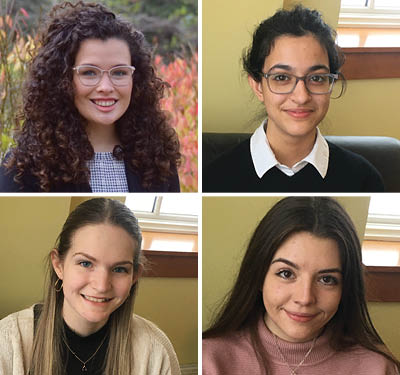
STU students studying human rights are part of a national research project examining local human rights issues in the context of international law.
The project is led by Alex Neve, former Secretary General of Amnesty International Canada, and Adjunct Professor of International Human Rights Law at the University of Ottawa and Dalhousie. He is supervising research teams as they examine the outcomes of United Nations-level human rights reviews to identify locally relevant issues. The students will also examine what mechanisms are in place at the provincial/territorial level to act on recommendations and ensure compliance.
The local component is co-ordinated by STU’s Atlantic Human Rights Centre and is comprised of student research teams of Brianna Bourgeois and Elisha Gunaratnam who are studying New Brunswick, and Paytra Waibel and Graci Young who are studying PEI.
The work involves research on provincial government and UN documents, interviews with government officials, lawyers, and civil and Indigenous groups, access to information requests, and a review of media reports and other sources. Except for STU, all other student research teams are from law schools across the country.
“Through analyzing United Nations level recommendations and applying them to the Atlantic provinces of New Brunswick and PEI, Elisha, Brianna, Graci, and I are attempting to effect real change here at home, and the possibilities are endless,” fourth-year student Paytra Waibel said.
“Canada holds an unfortunately controversial place on the international stage and doing this research will hopefully help spread awareness, and perhaps aid in implementing more international standards into domestic law.”
The students are accessing this opportunity through the Human Rights Internships course, which is offered to third or fourth year Human Rights students. Internship placements are offered through community partner organizations, ranging from governmental to community non-profit to academic, advocacy or activist in nature, including the Atlantic Human Rights Centre.
“Having a better understanding for human rights law and its implementation will complement my future plans in academia and the workforce and it is an opportunity that I will never forget. This internship is such an unbelievable privilege,” Waibel added.
“While Canada sees itself with a strong commitment to human rights, there has been little consideration of whether we measure up where it matters most, ensuring that international human rights are consistently and effectively upheld across the country,” said Neve.
“Given the country’s constitutional division of powers, the authority to address specific human rights concerns in Canada may be divided between or shared by federal, provincial and territorial governments. Federalism therefore requires innovation in ensuring that human rights are meaningfully and consistently respected across the country.”
Neve points out that no federal, provincial, or territorial government has an expressly empowered Minister of Human Rights and responsibility for upholding human rights is dispersed across government. This lack of explicit human rights leadership poses a challenge to clarity and accountability.
“The responsibility to comply with international human rights does not attach singularly to any one government in Canada, instead obligations attach to the country. Governments, working together, must live up to that responsibility.”
-(2).jpg)
/filters:format(webp)/prod01/stuca/media/stu/site-assets/images/features/STUBSA.jpg)
/filters:format(webp)/prod01/stuca/media/stu/site-assets/images/features/Accessibility-Week-News-Box.jpg)
/filters:format(webp)/prod01/stuca/media/stu/site-assets/images/features/Arts-Matters-News-Box.png)